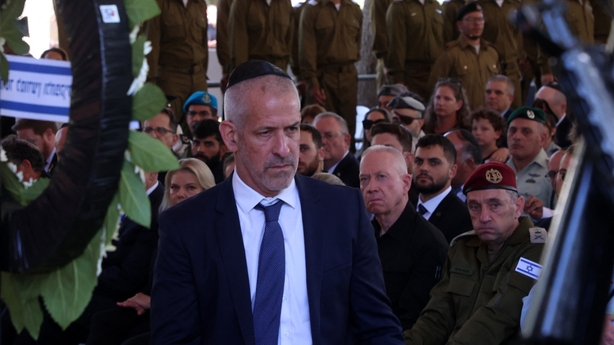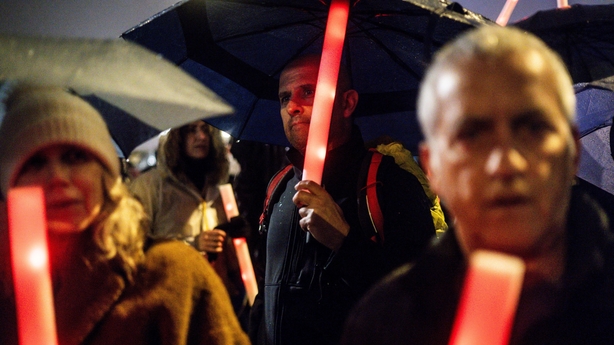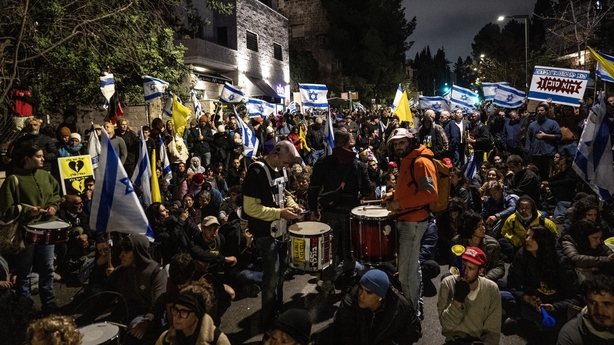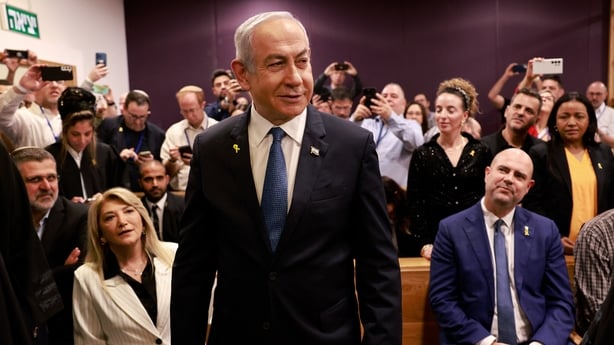For Israeli Prime Minister Benjamin Netanyahu, the evidence increasingly suggests the war in Gaza is more about political survival than military strategy.
"Almost every decision that has been made has been made through a political framework that serves the Prime Minister's interest," Aaron David Miller, a former US State Department Middle East analyst and negotiator, told RTÉ News.
"He has been doing this for the last 15 months on any number of issues, whether it's been withholding humanitarian assistance, whether it's the disregard for the numbers of Palestinian civilians that are being killed, or whether it's the lack of day-after planning for Gaza."
However, as Israel's bombardment of Gaza intensifies once again, the line between Mr Netanyahu's political self-preservation and national security objectives has never been more hazy.
This week's sequence of events speaks for itself.
On Sunday, the Israeli Prime Minister announced his intention to fire Ronen Bar, the head of Shin Bet, Israel's internal intelligence service.

The two men have been at odds over several issues - most notably a Shin Bet investigation into aides of Mr Netanyahu, who are suspected of receiving bribes from Qatar and engaging in activities that potentially compromise Israel's national security.
Earlier this month, Shin Bet issued a report into the 7 October attack. While it acknowledged the agency's own failures, it pointedly criticised years of lenient government policy toward Hamas at the hands of Mr Netanyahu.
Just over 24 hours after the announcement of Mr Bar's dismissal, the Israeli military launched a series of strikes on Gaza, making Tuesday one of the deadliest days in the territory since the war began.
More than 400 Palestinians were killed, and hundreds more were wounded.
"The most charitable interpretation of what Israel is doing is that it's an effort to pressure Hamas militarily so that it returns to the bargaining table," Mr Miller said.
But many ordinary Israelis are not convinced.
On Wednesday, thousands of demonstrators gathered in Jerusalem, both to call for a renewed ceasefire and hostage deal and to protest Mr Netanyahu's decision to fire Mr Bar.

The protests have continued for four straight days.
According to polls, the Israeli public is overwhelmingly in favour of bringing the war to a complete end, mostly so that the remaining hostages can be returned from Gaza.
Many Israelis have long accused the Israeli government of prioritising its goal of obliterating Hamas over securing the return of hostages - deliberately prolonging the war for political reasons.
This week's events have only reinforced those suspicions.
The demonstrators forced the closure of the main road into the city - echoing the mass protests of 2023, when hundreds of thousands took to the streets against Mr Netanyahu's plans to overhaul the judiciary, which many viewed as a threat to Israeli democracy.
The parallel between the protests is no coincidence - both being movements to challenge the prime minister's attempts to consolidate power at the expense of the country's institutions.
"The only checks on Israeli governmental power are the courts and public opinion," Mr Miller, now a senior fellow at the Carnegie Endowment for International Peace, said.

Mr Netanyahu has multiple reasons to resent the courts. Time and again, they have thwarted his political manoeuvres. The most recent example of that came only yesterday, when the country's Supreme Court issued a temporary injunction against Mr Bar's dismissal.
In its ruling, the court said it would hear petitions from campaigners who believe the move is an attempt to undermine the state's institutions.
However, for Mr Nethanyahu, it is also personal.
The prime minister has spent the past four years standing trial in a prolonged corruption case, which requires his attendance in court several times each month.
The Israeli leader has repeatedly used the war in Gaza as a justification for delaying his testimony. This week, he cited the renewed bombardment of Gaza as grounds to postpone a scheduled court appearance.
"He faces the possibility of a conviction on the one hand or a plea bargain agreement that would likely end his political career," said Mr Miller.
"So that impels him to remain in power, and it impels him to remain in power over the most right-wing government, by any standard, in Israel's history."
On the matter of that far-right government, critics also point to yet another helpful consequence of the renewed onslaught in Gaza - the immediate political dividend it delivered.

Itamar Ben-Gvir, the National Security Minister who had walked out of the cabinet in January in protest of the ceasefire agreement, announced his return to the coalition.
In declaring that his party would rejoin the government, Mr Ben-Gvir cited the resumption of military operations in Gaza as fulfilling his demands.
This strengthens Mr Netanyahu's parliamentary majority at a crucial moment - as his government faces an end-of-month deadline to pass a budget.
"The budget needs to be passed by the end of March," Mr Miller said.
"If it isn't, then the government automatically falls and Mr Netanyahu is out of power."
Of course, this combination of political manoeuvring and coalition-building all comes at a devastating cost for those in Gaza.
For years, critics have argued that Mr Netanyahu has conflated his personal political survival with Israel's national security interests.
As bombs fall once again on Gaza and protests swell in Jerusalem, that argument grows increasingly harder to refute.






